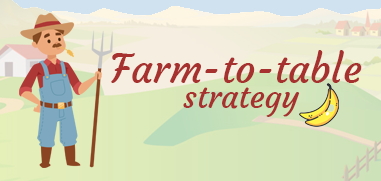The coronavirus crisis has underscored the need for a robust and resilient food system that works in all circumstances and is capable of ensuring access to a sufficient supply of affordable food for citizens.
Furthermore, the current situation It has made us aware of the interrelationships between our health, ecosystems, supply chains, consumption patterns and planetary limits.
And what is Clear is that we need to do much more to keep ourselves and the planet healthy.
We must be aware that both the current pandemic and the increasing recurrence of droughts, floods, forest fires and new pests are a constant reminder that our food system is threatened and it should focus on a system more sustainable and resistant.
The Farm to Table strategy
The strategy Farm to Fork is at the heart of the Agreement European Green, with the Aim to make food systems fair, healthy and environmentally friendly.
The strategy sets ambitious goals:
- A 50% reduction in the use and risk of chemical pesticides and the use of more dangerous pesticides by 50% by 2030.
- A reduction of nutrient losses by at least 50%, while ensuring that do not deteriorate soil fertility. This will reduce fertilizer use by at least 20% by 2030.
- 50% reduction in sales of antimicrobials for farmed animals and aquaculture by 2030
- Achieve 25% of agricultural land under organic agriculture by 2030
Another strategy is related to technology, since it is intended that all rural areas have access to the Internet (fast broadband) by 2025, to enable digital innovation and the progress of rural spaces.

The Farm to Fork Strategy. Source: https://ec.europa.eu/food/farm2fork_en
And to achieve the goals the EU members must take ambitious and far-reaching measures to fully implement existing legislation on pollution by nutrients, in order to avoid the leakage of associated nutrients that pollute the air and water, becoming harmful to human health and the environment.
The European Commission will develop, together with the member states, an integrated nutrient management action plan in order to reduce and prevent further pollution from the excessive use of fertilizers and to encourage the recycling of nutrients from different types of organic waste such as fertilizers.
Guarantee sustainable economic development
To achieve the objective of organic farming in the EU, is essential to guarantee the sustainable economic development of the sector and promote demand. In addition to the Common Agricultural Policy (CAP) measures, such as organic schemes, investments and advisory services, and the Common Fisheries Policy (CFP) measures, the Commission will present an Action Plan on organic farming.
Support for the main actors in the primary sector
The strategy aims to reward farmers, fishermen and other food chain operators who have already undergone the transition to sustainable practices, enable the transition for others and create additional opportunities for their businesses.
Likewise, the UE citizens have demanded a significant change in the food market demanding healthy, abundant, nutritious and high-quality food. This transition will also allow them to make sustainability their trademark and guarantee the future of the EU food chain.
The transition to sustainability presents is an opportunity for all actors involved in the food chain. An example of a new green business model. It is carbon sequestration by farmers and foresters. Agricultural practices that remove CO2 from the atmosphere contribute to the goal of climate neutrality and must be rewarded, either through the Common Agricultural Policy (CAP) or other public or private initiatives (carbon market).

Pingback: Ministers will discuss today about the PAC and Farm to Table - CONSOLE
Pingback: Top 5 Reasons to Follow a Paddock-to-Plate Diet - Local Food Market Co